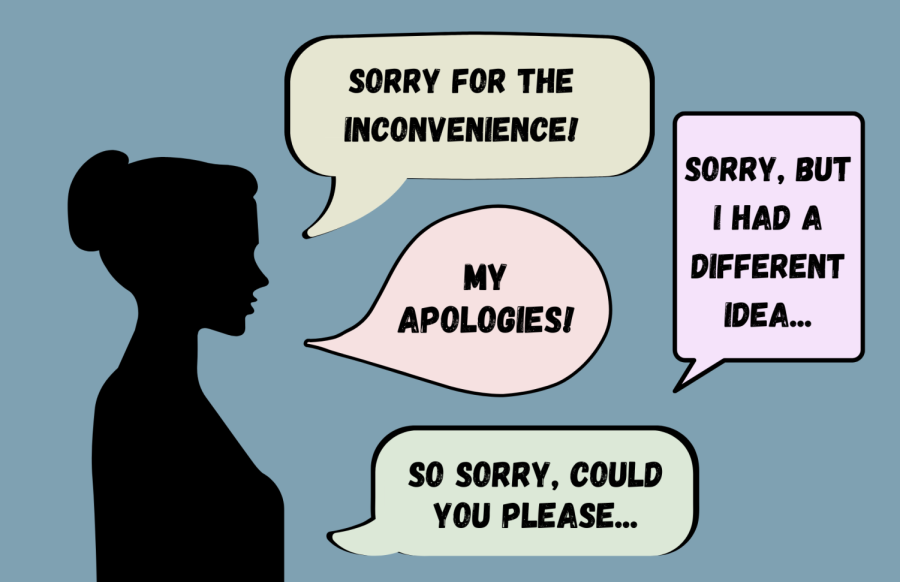Opinion | I’m not sorry… most of the time
January 13, 2022
Dear Reader. Before we begin, I would like to apologize for any inconveniences you may experience while reading this column. I know differences of opinion are natural, but I’m sorry if reading this puts you in a bad mood. I apologize if you feel like you’ve wasted precious minutes when you could have slept in more, enjoyed a hot breakfast or made a second cup of coffee. However, I do hope you find something valuable in what I’ve written. Once again, my deepest apologies if that is not the case. Sincerely, Writer.
Four, that’s how many times I managed to apologize in this five-sentence pseudo-email. While I would like to claim that that is an overexaggerated and completely unrealistic example, the truth is that I sent an almost identical email to my professor last semester not once, but twice. Granted, it wasn’t about an article I wrote, but about missing class. I managed to litter almost every single sentence of my emails with a pathetic “I’m sorry” or “my apologies.” Twice, my professor responded to my emails with the same opening sentence — don’t apologize. It’s time that I take their advice and realize that over-apologizing can be more damaging than we may think.
Over-apologizing is not a phenomenon exclusive to me. In fact, apologizing frequently is a tendency of many women, especially in professional spaces. A study from the University of Waterloo found that, on average, women apologize more than men because they have a lower threshold for what may be considered offensive, or actions that may necessitate an apology.
For example, a woman may apologize when she is late responding to an email — “sorry to keep you waiting” — where a man might not. A woman may apologize for missing a meeting due to extenuating circumstances— “apologies for my absence”— whereas a man might find that there is nothing to apologize for because he isn’t at fault.
The Child Mind Institute argues that a contributing factor for why women apologize more than men is that during childhood, girls are conditioned to be aware of the feelings of others more than boys. Boys are encouraged to be assertive and proud, which are stereotypical male traits. However, those same traits in a girl are often interpreted as “bossy” or “conceited.” Women tend to downplay their success for the sake of others’ feelings.
Over-apologizing can harm women not only in their daily lives, but also in a professional setting. Women are leaving the workforce at higher rates than men and are once again becoming the minority. Over-apologizing can portray an inferior status in an environment already dominated by men. The damages of over-apologizing are twofold — it lowers self-confidence and it devalues the apology.
Every time you preface an opinion with an apology, you are conveying to your peers that you are guilty for having an opinion. This constant apologizing undermines yourself and the information you are trying to share, no matter how valuable it may be. For example, the introduction to this article contained a gross abundance of apologies — giving the impression that I wasn’t confident in the opinion I was about to express. By constantly apologizing for what you, the reader, may think, I conveyed that I don’t have any confidence in what I think.
As children, we learn to apologize when we have done something wrong. Therefore, unnecessarily apologizing can train you to feel excessively guilty when you haven’t done anything wrong. For example, if you apologize every time you disagree with someone, you will train yourself to feel guilty for having a different opinion— you’re Pavloving yourself, my friend.
If you are consistently over-apologizing when it is unnecessary, your apologies begin to lose their value. A study from the Journal of Experimental Social Psychology describes this phenomenon as “normative dilution.” Essentially, if you’re apologizing because it seems appropriate for the situation rather than because you feel genuine remorse, you reduce the symbolic value of the words “I’m sorry.” It’s a simple case of the boy who cried wolf — every time you apologize when you don’t really mean it, your apologies will appear less genuine when you actually do.
It’s not easy to stop over-apologizing. I’ve had that awkward exchange where someone tells you to stop apologizing and your instinctive response is “sorry.” However, here’s an actionable tip to help you as you move forward.
Every time you find yourself wanting to say “I’m sorry,” say “thank you” instead. “I’m sorry for being late” becomes “thank you for your patience.” “I’m sorry if this doesn’t make sense” becomes “thank you for understanding.” “I’m sorry if I’m talking too much” becomes “thank you for listening.”
This way, instead of expressing guilt, you express appreciation. Take the focus off of yourself, not everything is your fault. Saying “thank you” and expressing appreciation to your peers reinforces a positive work environment instead of constantly devaluing your own worth.
Overall, just be mindful of your apologies. The words “I’m sorry” are powerful, and we should all be comfortable apologizing when we’ve done something wrong. Overusing your apologies does more harm than good. So, every time you start to say or type “I’m sorry,” take a moment to make sure you really are. If you aren’t, find another way to express how you feel, and save your apologies for when you really need them.
Lastly, reader, I just want to say thank you. Thank you for reading this article, I appreciate it.
Anna Fischer writes about female empowerment, literature and art. She’s really into bagels. Write to her at [email protected].








